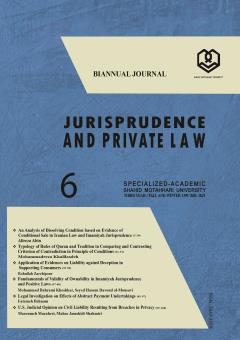-
-
-
Open Access Article
1 - Legal-Jurisprudential Analysis of Conditional Sale Option in Relation to Transactions with Right of Restitution
Saeed KaramiAbstract: There is divergence of opinions on contracting or pledging in optional sale. Imamiyah jurists endorse the act and consider it as an instance of sale in nature. Sunni jurists identify optional sale as bay’ al-Wafa or buyback sale, associating it with a pledge ( MoreAbstract: There is divergence of opinions on contracting or pledging in optional sale. Imamiyah jurists endorse the act and consider it as an instance of sale in nature. Sunni jurists identify optional sale as bay’ al-Wafa or buyback sale, associating it with a pledge (rahn) contract. The conditional sale can be analyzed in two ways: First, the conditional sale involving the contractual relationship between mortgagor (seller) and mortgagee (buyer) stipulated in Article 34 of the Law on Registration of Deeds; Second, the conditional sale that does not govern the contractural relationship between the seller and buyer, and it is a real sale under articles 485-462 of the Law. The conditional sale governing the contractural relationship between the mortgagor and mortgagee is an instance of transaction with the right of restitution (Article 33 of the Law). This is why the law has considered the request for registration of the property in conditional sale as a right for the debtor, because in this type of conditional sale the buyer does not intend to conclude a contract of sale. Any negligence of this criterion will raise ambiguities: First, any conditional sale will be taken as the one with the right of restitution, whereas it is otherwise. Second, the real conditional sale has been well stipulated in Article 399 of the Civil Code; therefore, all sales stipulated in Article 399 of the Civil Code must be considered as the transactions with the right of restitution. It is clear that the existence of the element of option in a sale contract does not mean it is an instance of transaction with the right of restitution. Articles 33 and 34 of the Law on Registration of Deeds are not exclusive to provisions of Article 459, because this article is not about the conditional sale governing the contractual relationship between the mortgagor and mortgagee, whereas articles 33 and 34 of the Law govern such relationship. Manuscript profile -
Open Access Article
2 - An Analysis of Dissolving Condition based on Evidence of Conditional Sale in Iranian Law and Imamiyah Jurisprudence
Alireza AbinA broad interpretation of the dissolving condition indicates that it is a condition realization of which revokes undertaking(s) between the obligor and the obligee and cancels the contract or other similar legal instruments from the beginning (with a retroactive effect) MoreA broad interpretation of the dissolving condition indicates that it is a condition realization of which revokes undertaking(s) between the obligor and the obligee and cancels the contract or other similar legal instruments from the beginning (with a retroactive effect). There is no express legal text on the rule of dissolving condition in domestic standing laws. This has given birth to diversified reasoning by the legal experts. Moreover, in legal terms, the approach followed by Imamiyah jurists vis-à-vis this legal institution is not identical so that some consider it problematic based on such evidences as principle of definitiveness of conditions, inconsistency of dissolving condition with requirement of nature of condition and lack of legality of evidences on conditions. On the contrary, some believe in the soundness of the institution of dissolving condition based on the legality of the evidences on conditions. This paper is devoted to analysis of consequent opinions and approaches of experts to finally put forth its selected viewpoint on feasibility of soundness and use of such institution in Iranian law and Imamiyah jurisprudence and prove legal soundness of its application on attachment of Articles 232 and 233 of Civil Law to Articles 10 and 975 of the same law. However, it seems that the generality of evidences on conditions prove legality of conditions in creating or destroying the legal effects. Manuscript profile
List of Articles conditional sale
-
The rights to this website are owned by the Raimag Press Management System.
Copyright © 2017-2024


